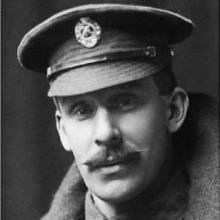
The Lord Provost, Frank Ross, unveiled a commemorative flagstone this morning to honour the bravery of a First World hero.
Sapper Adam Archibald, was born at 24 Shaw's Street in 1879, and later lived at Balfour and Hillhouse Streets. He was awarded the Victoria Cross by King George V in May 1919.
His citation read:
On 4 November 1918 near Ors, France, Sapper Archibald was with a party building a floating bridge across the canal. He was foremost in the work under a very heavy artillery barrage and machine-gun fire. The latter was directed at him from a few yards distance while he was working on the cork floats. Nevertheless he persevered in his task and his example and efforts were such that the bridge which was essential to the success of the operations was very quickly completed. Immediately afterwards Sapper Archibald collapsed from gas poisoning.

Archibald had joined the 7th Durham Light Infantry in 1915, and transferred to the 218th Field Company, Royal Engineers during the Second Battle of the Sambre. His feat of courage came during an ultimately failed attempt to cross this section of the heavily defended Sambre-Oise Canal in northern France.
British forces were more successful to the left and right of Archibald's position, but in the same action the poet Wilfred Owen was killed 1.5km away, one week before the end of the war.
The paving stone laid today is one of three recently installed across the city. Today, the Lord Provost spoke of feeling 'humbled' by Archibald's 'extreme courage, strength and determination' in selflessly risking his life for the benefit of his fellow soldiers.

Also present at the ceremony were Major Eddie Walsh, representing the Corps of Royal Engineers 71 Engineer Regiment, Legion Scotland standard bearers, a bugler, Cllrs Rae and Macneese-Mechan, and 14 descendants of Sapper Archibald, some of whom had travelled from Virginia in the USA to attend.
Ann Aird said her grandfather did not like to talk about his experiences in France. After the war, he returned to his former job with Stuart's Granolithic. He enjoyed his garden, football (he had once trialled for St Bernard's FC), bowls, and family. He died peacefully at home, aged 76, in 1957.
For further details, see HERE.
